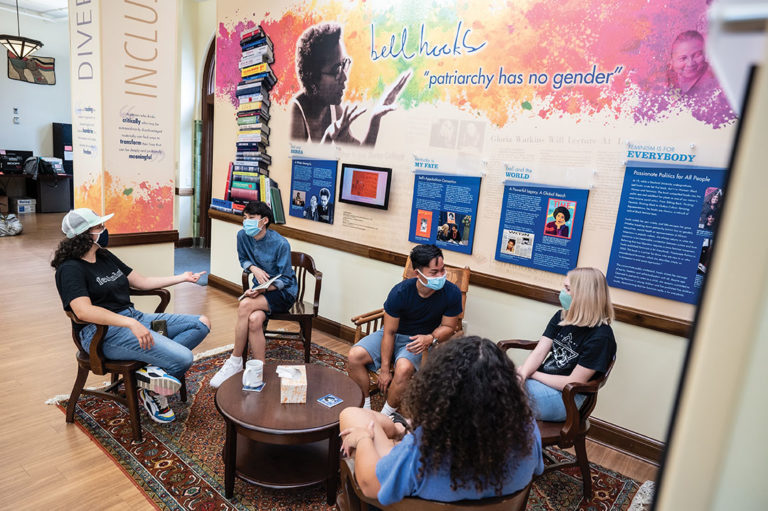On Sept. 22, just days before bell hooks’ 69th birthday, Berea College officially launched the opening of the bell hooks center on campus. Located in the iconic Draper Building, the center is an inclusive space where historically underrepresented students can come to be as they are, outside of the social scripts that circumscribe and discipline their living.
The newly renovated space has been home to Berea’s Women and Gender (and soon to be, Sexuality) Studies Department for decades and served as hub for feminist learning, gathering, discussion and discovery for students, faculty and staff. Today, the center hosts programs, collaborations and events that affirm underrepresented students’ sense of self and belonging—on campus and in the world.
Motivated by hooks’ famous insights that “patriarchy has no gender” and that, therefore, “feminism is for everybody,” the new center honors hooks’ legacy by supporting students as social justice leaders who actively defy sex and gender categorization so that their many and varied expressions of difference thrive.
The bell hooks center’s flagship speaker series hosts leading feminist scholars, activists and artists who teach the campus and community how to navigate and agitate against intersecting structures of power.
“We believe that an understanding of how sex and gender oppression are products of not just the patriarchy but also of racial oppression,” said Dr. M. Shadee Malaklou, inaugural director and founder of the bell hooks center, “has the potential to chart a new chapter in Berea College’s great, historical commitments—one that cultivates radical coalition between women, LGBTQPIA+ students, and students of color.”
Designed for inclusion
Entering the center, guests are greeted by a warm living room space with bookshelves throughout that feature hooks’ most influential works. Various displays tell the robust history of the department’s beginnings and evolution; of hooks’ life, works and influences; and, especially, of the intersectional history of gender equity at Berea College. Together, these stories tell visitors where the College has been as well as where it’s going.
The center’s intentional inclusivity is built into its design and is embedded in its programming, informing the entire experience of feeling and knowing in the center. Guests enter a cozy respite space with floor furniture, beanbags and rockers. In these spaces, as well as in the two study spaces where students can read and work collaboratively, the furniture is all size-friendly and accessibility-friendly, making the space an inclusive one that enables what feminist theorist Karen Barad describes as “common-unity.”
“It is our hope that the students who study and rest at the bell hooks center will be able to find themselves as well as each other,” Dr. Malaklou said. •


